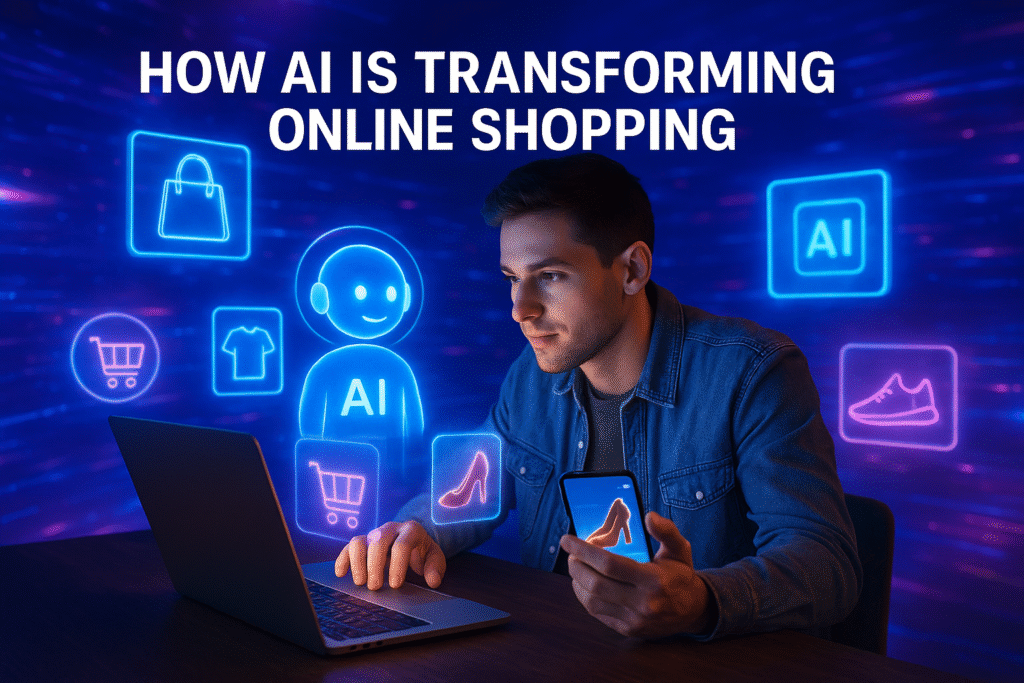🛒 Introduction
Online shopping has evolved far beyond clicking “Add to Cart.”
In 2025, Artificial Intelligence (AI) is driving a retail revolution — making shopping faster, smarter, and more personalized than ever before.
From virtual shopping assistants to predictive product recommendations, AI is turning e-commerce into a hyper-personalized experience that feels more human than ever.
Let’s explore how AI is transforming online shopping and shaping the future of digital retail.
🤖 1. Personalized Shopping Experiences
AI analyzes customer behavior, search patterns, and purchase history to recommend products that match individual tastes.
💡 Example:
When you browse for sneakers, AI doesn’t just show random pairs — it shows your preferred size, color, and price range based on past purchases.
Benefits:
- Increased customer satisfaction
- Higher conversion rates
- Reduced decision fatigue
📈 AI Tools: Amazon’s Recommendation Engine, Shopify’s Kit, and Google Retail AI.
💬 2. Chatbots and Virtual Shopping Assistants
AI-powered chatbots are now acting as 24/7 sales agents.
They answer questions, recommend products, and guide customers through checkout — instantly.
🧠 Benefits:
- Faster response times
- Reduced human workload
- Higher customer engagement
💡 Example:
H&M’s AI chatbot on Kik helps users find fashion items that match their style — instantly improving sales and user satisfaction.
📷 3. Visual Search and Image Recognition
Shoppers can now upload an image, and AI finds similar products automatically.
🛍️ How it works:
AI analyzes the picture’s color, texture, and shape — then matches it with products in the store’s catalog.
💡 Example: Pinterest Lens and Google Lens let users search products visually, turning inspiration into instant shopping.
Result: A faster, more intuitive shopping journey.
🧠 4. Predictive Analytics for Smarter Inventory
AI doesn’t just help customers — it helps businesses predict what to stock.
By analyzing sales trends, seasons, and user behavior, AI forecasts which products will sell best.
💡 Benefits:
- Reduced overstocking
- Lower storage costs
- Increased profit margins
💡 Example:
Walmart uses AI-driven demand forecasting to ensure products are always available when customers need them.
🕶️ 5. Augmented Reality (AR) Shopping Experiences
AI and AR now allow users to “try before they buy.”
🛋️ Examples:
- IKEA Place: Lets customers visualize furniture in their home.
- Sephora Virtual Artist: Allows users to test makeup virtually.
This AI-driven AR integration reduces returns and increases buyer confidence.
🔎 6. Dynamic Pricing and Smart Discounts
AI constantly monitors market trends, competitor pricing, and demand to automatically adjust product prices.
💡 Example:
Amazon changes prices of millions of products daily using AI-driven pricing algorithms to stay competitive.
Benefits:
- Real-time optimization
- Fair and flexible pricing
- Increased revenue
💬 7. AI-Powered Reviews and Sentiment Analysis
AI analyzes customer reviews and detects genuine feedback vs fake reviews.
🧠 How it helps:
- Identifies real product satisfaction levels
- Flags fake or spam comments
- Improves brand trust
💡 Example: Shopify AI uses natural language processing (NLP) to summarize product reviews and highlight key insights.
📦 8. Smarter Logistics and Delivery Systems
AI is transforming the back-end of online shopping too — from packaging to last-mile delivery.
🚚 Examples:
- Route optimization for faster deliveries
- Predictive inventory placement
- Drone and robotic delivery systems
💡 Example:
Amazon uses AI-powered robots in warehouses and autonomous drones for same-day delivery.
🧩 9. Voice Commerce: The Rise of AI Shopping Assistants
Voice assistants like Alexa, Siri, and Google Assistant are reshaping how customers shop.
🎙️ Example:
Customers can now say, “Order me more coffee pods,” and AI places the order automatically.
Benefits:
- Hands-free convenience
- Seamless integration with smart homes
- Simplified reordering process
🌍 10. Hyper-Personalized Marketing Campaigns
AI-driven marketing tools analyze user interests and send targeted ads that feel tailor-made.
💡 Example:
AI can send an email about fitness gear just after you’ve searched for “home workout.”
Tools:
- ChatGPT for content generation
- Jasper AI for ad copy
- HubSpot AI for campaign management
⚙️ 11. Fraud Detection and Secure Payments
AI algorithms monitor real-time transactions and detect suspicious activity before fraud happens.
💡 Example:
PayPal’s AI models track abnormal purchase behavior to prevent fraud instantly.
Result: Safer payments, greater customer trust, and reduced chargebacks.
🔮 12. The Future of AI in E-Commerce
By 2030, AI will completely personalize the shopping journey — from discovery to delivery.
🌐 Emerging trends:
- AI stylists for fashion
- Virtual showrooms for luxury brands
- AI-driven sustainability analytics
- Emotional AI that understands mood-based shopping
The future of e-commerce is not just digital — it’s intelligent.
✅ Conclusion
AI is no longer a luxury for online retailers — it’s the foundation of success.
From chatbots and dynamic pricing to virtual try-ons and predictive analytics, AI is reinventing how we shop, sell, and experience products online.
“The future of online shopping isn’t about algorithms — it’s about understanding people through AI.”


